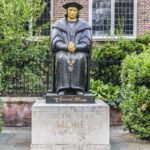
Published January 30, 2023
In June 2022, Colorado became the first state to pass a law instituting protections for “donor-conceived persons,” or DCPs: individuals who are created via anonymous sperm donation. The law reflects the strange reality of life as a DCP: among other things, it grants DCPs a “right” to learn the identity of their biological fathers upon turning eighteen. It also permits them to learn their paternal medical history before that. The law is a technocratic attempt to fix a system that is morally ambiguous at best, and that was patched together with little regard for its “products”: the many children that were brought into the world with no way of learning about their biological parents.
Statistics on how many children in the United States have been born via anonymous sperm donation are not clear, but in 1979, an estimated 250,000 people were conceived in this way. Sperm banks have proliferated since then. The business of sperm donation was originally designed to protect the confidentiality of sperm donors and parents; for a time, many physicians would artificially inseminate only married women and, of course, marriages were limited to heterosexual unions. A culture of secrecy was built around the wish to protect couples who were struggling with infertility. Often, children were never told the truth about their parentage.
That has changed, as single women and women in same-sex relationships increasingly turn to sperm banks in hopes of becoming parents. Doctors have accepted this trend, and thousands of children have been brought up knowing that their fathers never intended to meet them. In other words, the culture of secrecy around the use of sperm donation has faded, but the identities of anonymous sperm donors are still kept hidden. At the same time, it is easy to discover one’s genetic history via genealogy services such as Ancestry.com or 23AndMe.
All this has led to startling human consequences. In June 2019, the New York Times published a photo essay by Eli Baden-Lasar, a young man who had traveled the country for years in order to meet and photograph the many half-siblings he discovered through a donor sibling registry.
The fact that Eli’s father was an anonymous donor was never concealed from him by his two mothers, but at the age of eleven, he began pressing them for more information about this man. They gave him a photocopy of a questionnaire that their donor had filled out at the sperm bank. As Eli wrote,
I remember carrying the form with me in my backpack, taking it to school and studying it occasionally when I remembered I had it. There was this sense of touch—this person had used his hand to answer these questions; I could see where he had crossed things out. It wasn’t that I was so desperate to imagine who he was; it was enough to have proof that he was real, entangled with who I am and yet, as that document showed, totally separate. The form made him concrete, if inscrutable. It also gave me the sense that there was this larger world, this process and this bureaucracy that my existence was built upon. It was a way to help me understand myself.
As Eli tracked down his dozens of siblings, he began to experience a “feeling of having been mass-produced.” He wanted his photographs to serve as a corrective to that; as he wrote, “The emotional labor of the project was intended to be almost reparative—a response to the transactional nature of the sperm bank and the financial exchange our parents made in order to create us.”
Eli’s story is an example of the sorts of problems that arise even when things go “right” in the fertility industry. He may feel justifiably overwhelmed by the knowledge that he will probably never know his father or all his siblings, but the terms of his mothers’ agreement were honored. Another teenager in a similar situation learned that his biological father, who had provided sperm for at least twenty-four children, carries a genetic disorder that causes a potentially fatal heart defect. Both cases, however troubling, were well within legal parameters.
Sometimes, the deceit crosses legal lines. In April 2022, Netflix released the documentary “Our Father,” which details how Indiana-based fertility specialist Dr. Donald Cline fathered upwards of ninety children by using his own sperm to inseminate dozens of clients without their knowledge. Similar cases of “fertility fraud” have come to light across the country in recent decades; with the growing popularity of genealogy services, it is increasingly difficult to keep them secret.
These revelations can be shattering. But this kind of fraud is primarily viewed as an offense against the women who are impregnated with sperm from the wrong man. Texas and Arkansas, for example, have laws on the books specifically prohibiting the practice, and federal prosecutors have used generally applicable anti-fraud and other criminal statutes to charge doctors who have engaged in fertility fraud. For the children involved, however, there is little legal recourse or consideration. No one gets to choose their biological parents, of course, but in the case of most anonymous DCPs, the plan was always to leave them in the dark in one way or another.
There are haunting historical parallels to this sort of treatment. In the first paragraphs of his 1845 memoir, the orator and former slave Frederick Douglass plainly states that he does not know his age, and that “[b]y far the larger part of the slaves know as little of their ages as horses know of theirs, and it is the wish of most masters to keep their slaves thus ignorant.” He goes on:
A want of information concerning my own [age] was a source of unhappiness to me even during childhood. The white children could tell their ages. I could not tell why I ought to be deprived of the same privilege. I was not allowed to make any inquiries of my master concerning it. He deemed all such inquiries on the part of a slave improper and impertinent, and evidence of a restless spirit.
Soon after, Douglass notes that he was taken from his mother as an infant and has no knowledge of his father, and that “the means of knowing was withheld” from him. Throughout the book, Douglass details slavery’s more obvious and violent horrors. But it is worth noting that he begins his story by pointing out the void left him by those who were unwilling to provide him with basic knowledge of his arrival in the world.
In attempting to create families, doctors across the country have created people who, on a fundamental level, do not know who they are. Again, no one gets to choose the family into which they are born. But medical professionals have willingly abetted the conception of human beings in circumstances marked by deceit; or, at the very least, marked by deliberate withholding. The people created in this manner rightfully feel misused or neglected.
To return to the Colorado law, one organization in particular celebrated its passage: the U.S. Donor Conceived Council (USDCC). Founded in 2022 by a group of DCPs, the nonprofit’s mission is to increase “awareness of the needs, interests, and challenges of donor conceived people and [to] advance change that promotes and protects their health, welfare, and human rights.” The questions surrounding what rights are owed to DCPs, and how to understand and protect their particular needs and interests, are not simple.
Virtually all the people involved in USDCC have compelling stories of when they first learned the truth about their lineage, and the subsequent emotional fallout. Some are frustrated by the fact that their parents kept it from them for so long; others are the victims of fertility fraud and feel violated; some mourn the fact that they are not permitted to meet or even learn the identity of their biological fathers. Many feel, as one of Eli Baden-Lasar’s half-siblings put it, “drowned out with the numbers,” “like a statistic instead of a person.” They feel commodified, as if they were bought and paid for in order to improve the lives of others, with scant consideration for their own needs—including that of establishing a basic sense of identity. Virtually all the parents and doctors who engaged in this practice had no way of relating to the experiences of the children they created in this way.
Colorado’s new law is a useful step. Attempts to place some limits on confidentiality in this area are important. But this should also be a moment to take stock of a medical culture that has encouraged a practice that in retrospect seems obviously fraught with pain for the most vulnerable among us. Rather than simply viewing themselves as providers serving consumers, doctors should consider themselves professionals bound to principles of their discipline, with an ethical responsibility for the long-term repercussions of their actions.
Devorah Goldman is EPPC’s Tikvah Visiting Fellow. Her work focuses primarily on medical policy, culture, and public bioethics.
Photo by Sam Moghadam Khamseh on Unsplash
Devorah Goldman is EPPC’s Tikvah Visiting Fellow. Her work focuses primarily on medical policy, culture, and public bioethics.









